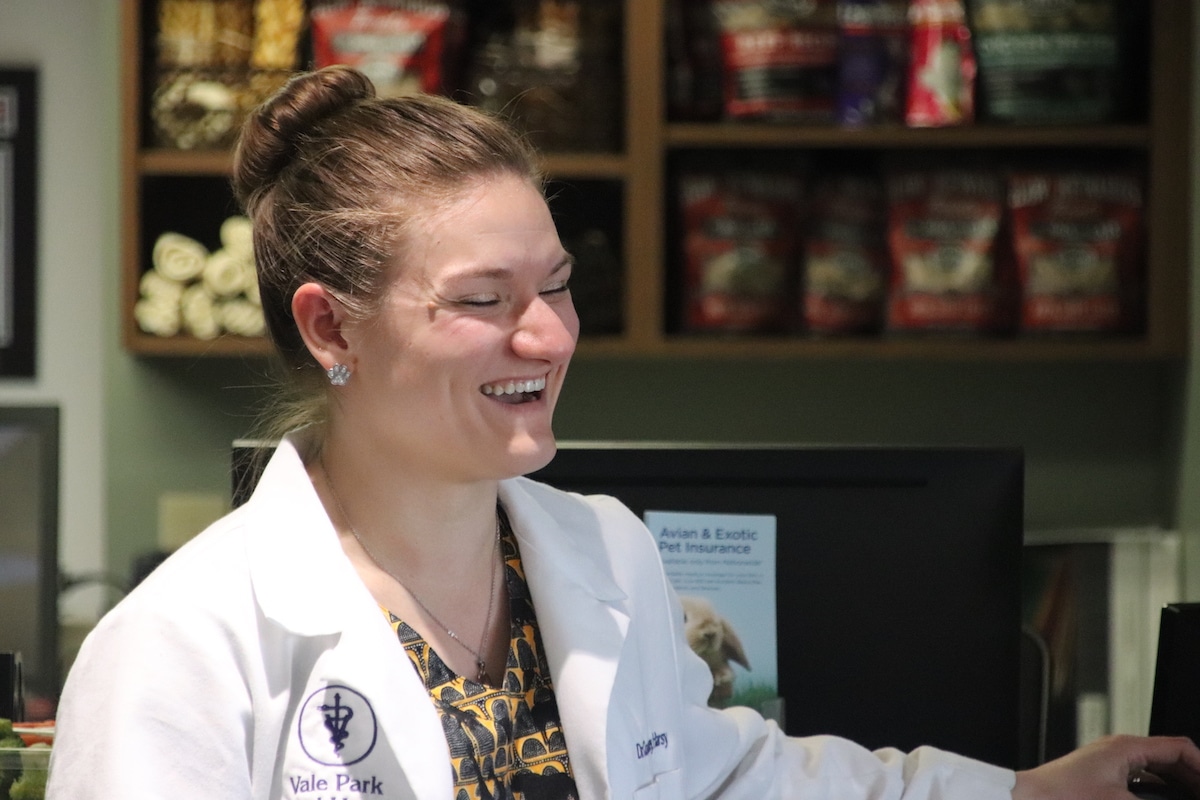If a pet is not a cat or a dog, it is considered exotic. Exotics include reptiles that live in tanks, but also furry friends like rabbits and guinea pigs. Dr. Harsy shared her personal and professional expertise on a wide range of exotics at Vale Park Animal Hospital on Saturday to offer valuable insights for current and prospective exotic pet owners.
“This event is to help spread some of the beginner info about exotic pets,” Dr. Harsy said. “I want to help people know more about basic care and avoid pitfalls where emergency situations crop up.”
Attendees were treated to veggie and fruit trays for a brief meet-and-greet in the lobby before the presentation began. After the presentation, attendees were invited to meet with Dr. Harsy so she could answer questions specific to their personal situations.
The presentation began by identifying the best pets to buy based on the owner’s personality and lifestyle. For example, a vegetarian might not be willing to feed once-live prey to a family pet, thereby turning a perfectly stylish snack into a firm no. However, other exotic pets are vegetarians themselves, making them a preferred choice for vegetarian owners.
“There are two types of people: the people who research every little last thing to find out about that species because they’re so into it, but the most common are people who find something they like at the pet store and don’t do much research beyond reading labels,” Dr. Harsy said.
The portion of the presentation that helped potential owners pick their best pets offered a wide range of insights, including what kind of particular care is needed, the proper handleability and disposition, and preferred playing hours of each pet type. For instance, many reptiles require UVB lights, and these expire after 6 months of use. Male rabbits are more likely to let you pet, and ferrets are nocturnal, but will play all the time if that is cool with you.
From there, each pet type was explained more specially to expand understanding of exact requirements of each pet. Attendees learned about humidifying tanks, varying diets, environments, why owners should avoid feeding live prey unless absolutely necessary, and the fact that snakes poop.
“Because exotics don’t need vaccines, owners sometimes don’t bring them for regular veterinary visits, which means they don’t find out that they need fresh greens on top of the pelleted diet or adding vitamin C. They just don’t know,” Dr. Harsy said. “Since exotic species tend to hide their illnesses, it’s hard to notice the early signs of disease. By the time the owner realizes something’s wrong, it might be too late.”
Allison Ashbrooks of Crown Point brings her ball python, Rebecca, bearded dragon, Ryu, and leopard gecko, Mango, to Vale Park Animal Hospital because she appreciates Dr. Harsy’s expertise. Dr. Harsy included a question and answer section, and Allison participated.
“Obviously my favorite parts of the presentation were when she was talking about the pets I love and care for,” Ashbrooks said, “But it’s interesting to learn about the kinds of pets I’ve never owned before.”
Dr. Harsy is open to hosting more events like this in the future and has considered making them more specific to the type of pet so that the conversations can be tailored to the owners.
“I personally love Vale Park Animal Hospital because of their kind considerate approach to my animals,” Ashbrooks said. “Everybody is nice and welcoming, and I trust Dr. Harsy’s expertise. She’s a very good exotic doctor and I’m very glad they added her to the team.”
If you have an exotic pet living in your home and heart, or are interested in adding one to your family, get in touch with Dr. Harsy at Vale Park Animal Hospital. Her expertise is regularly available at the hospital, and Vale Park Animal Hospital looks forward to putting more of her expertise on display with future events like this.




